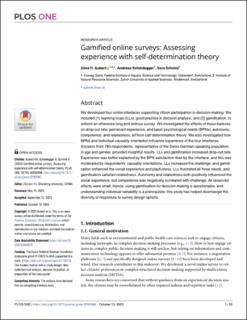Bitte benutzen Sie diese Kennung, um auf die Ressource zu verweisen:
https://doi.org/10.21256/zhaw-28967| Publikationstyp: | Beitrag in wissenschaftlicher Zeitschrift |
| Art der Begutachtung: | Peer review (Publikation) |
| Titel: | Gamified online surveys : assessing experience with self-determination theory |
| Autor/-in: | Aubert, Alice H. Scheidegger, Andreas Schmid, Sara |
| et. al: | No |
| DOI: | 10.1371/journal.pone.0292096 10.21256/zhaw-28967 |
| Erschienen in: | PLOS ONE |
| Band(Heft): | 18 |
| Heft: | 10 |
| Seite(n): | e0292096 |
| Erscheinungsdatum: | 2023 |
| Verlag / Hrsg. Institution: | Public Library of Science |
| ISSN: | 1932-6203 |
| Sprache: | Englisch |
| Schlagwörter: | Gamification; Public decision-making; Survey; Basic psychological need theory; Causality orientations theory; Citizen |
| Fachgebiet (DDC): | 150: Psychologie |
| Zusammenfassung: | We developed four online interfaces supporting citizen participation in decision-making. We included (1) learning loops (LLs), good practice in decision analysis, and (2) gamification, to enliven an otherwise long and tedious survey. We investigated the effects of these features on drop-out rate, perceived experience, and basic psychological needs (BPNs): autonomy, competence, and relatedness, all from self-determination theory. We also investigated how BPNs and individual causality orientation influence experience of the four interfaces. Answers from 785 respondents, representative of the Swiss German-speaking population in age and gender, provided insightful results. LLs and gamification increased drop-out rate. Experience was better explained by the BPN satisfaction than by the interface, and this was moderated by respondents' causality orientations. LLs increased the challenge, and gamification enhanced the social experience and playfulness. LLs frustrated all three needs, and gamification satisfied relatedness. Autonomy and relatedness both positively influenced the social experience, but competence was negatively correlated with challenge. All observed effects were small. Hence, using gamification for decision-making is questionable, and understanding individual variability is a prerequisite; this study has helped disentangle the diversity of responses to survey design options. |
| URI: | https://digitalcollection.zhaw.ch/handle/11475/28967 |
| Zugehörige Forschungsdaten: | https://doi.org/10.25678/0008VR |
| Volltext Version: | Publizierte Version |
| Lizenz (gemäss Verlagsvertrag): | CC BY 4.0: Namensnennung 4.0 International |
| Departement: | Life Sciences und Facility Management |
| Organisationseinheit: | Institut für Umwelt und Natürliche Ressourcen (IUNR) |
| Enthalten in den Sammlungen: | Publikationen Life Sciences und Facility Management |
Dateien zu dieser Ressource:
| Datei | Beschreibung | Größe | Format | |
|---|---|---|---|---|
| 2023_Aubert-etal_Gamified-online-surveys.pdf | 1.75 MB | Adobe PDF |  Öffnen/Anzeigen |
Zur Langanzeige
Aubert, A. H., Scheidegger, A., & Schmid, S. (2023). Gamified online surveys : assessing experience with self-determination theory. Plos One, 18(10), e0292096. https://doi.org/10.1371/journal.pone.0292096
Aubert, A.H., Scheidegger, A. and Schmid, S. (2023) ‘Gamified online surveys : assessing experience with self-determination theory’, PLOS ONE, 18(10), p. e0292096. Available at: https://doi.org/10.1371/journal.pone.0292096.
A. H. Aubert, A. Scheidegger, and S. Schmid, “Gamified online surveys : assessing experience with self-determination theory,” PLOS ONE, vol. 18, no. 10, p. e0292096, 2023, doi: 10.1371/journal.pone.0292096.
AUBERT, Alice H., Andreas SCHEIDEGGER und Sara SCHMID, 2023. Gamified online surveys : assessing experience with self-determination theory. PLOS ONE. 2023. Bd. 18, Nr. 10, S. e0292096. DOI 10.1371/journal.pone.0292096
Aubert, Alice H., Andreas Scheidegger, and Sara Schmid. 2023. “Gamified Online Surveys : Assessing Experience with Self-Determination Theory.” Plos One 18 (10): e0292096. https://doi.org/10.1371/journal.pone.0292096.
Aubert, Alice H., et al. “Gamified Online Surveys : Assessing Experience with Self-Determination Theory.” Plos One, vol. 18, no. 10, 2023, p. e0292096, https://doi.org/10.1371/journal.pone.0292096.
Alle Ressourcen in diesem Repository sind urheberrechtlich geschützt, soweit nicht anderweitig angezeigt.